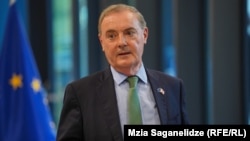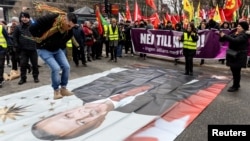
Welcome to Wider Europe, RFE/RL's new newsletter focusing on the key issues concerning the European Union, NATO, and other institutions and their relationships with the Western Balkans and Europe's Eastern neighborhoods.
I'm RFE/RL Europe Editor Rikard Jozwiak, and this week I'm drilling down on two major issues: the EU’s reluctance to use its new anti-circumvention tool and the lessons learned from an EU summit two decades ago
Brief #1: The EU Creates A Sanctions Tool It Likely Won't Use
What You Need To Know: When EU member states finally approved the bloc's latest sanctions package against Russia on June 23, perhaps the most interesting feature was a new anti-circumvention framework aimed at third countries. Although this framework for the moment very much remains an empty canvas, it has now given Brussels the legal tools to do two things: Draw up a list of products made in the bloc that it believes are being sent to Russia via third countries, and another register in which third countries can be named and hence will no longer be able to import things from the EU.
This move will, in theory, bring the EU closer to the "secondary sanctions" that the United States is already applying around the globe -- a framework designed to prevent or restrict third countries from trading with countries subject to U.S. sanctions. And there is little doubt that the new EU tool might come in handy going forward.
Estonia, Latvia, Lithuania, and Poland have all pointed out that, in 2022, exports of potential dual-use goods -- items that can be used for both civilian and military purposes -- to Kazakhstan, Kyrgyzstan, and Uzbekistan grew more than 62 percent, 83 percent, and 30 percent, respectively, compared to the previous year.
The EU’s sanctions implementation envoy, David O'Sullivan, has in recent months traveled extensively to both Central Asia and places such as Armenia and Georgia to hammer home the message that items, or parts of them, imported from the EU to other countries have been found in Russian military equipment and weapons used in its war against Ukraine. A senior EU official with knowledge of the matter, speaking under the condition of anonymity, noted that “we are seeing circumvention. Look at the envoy and where he is traveling. There is evidence that something is happening.”
Deep Background: The big question, however, is if the EU will ever use this instrument. The smart money is that it won’t, and that the lists will remain empty. Pretty much all of the EU officials I have spoken to essentially say the same thing: It is a last-resort measure, only to be used when all other things have failed -- notably, more intense diplomacy.
I hear that this is a tool designed for O’Sullivan to threaten the countries he travels to with, but nothing more. And people familiar with the topic also explain to me that Brussels isn’t at all keen to push countries into the arms of Russia and China. This is the sort of tool that would accomplish exactly that.
As evidence, they point to countries like Serbia and Georgia that, despite their refusal to align with EU sanctions on Moscow -- even to the point of allowing Russian flights to land on their soil -- still haven’t faced any negative consequences from Brussels for their actions.
Finally, there is the issue of unanimity, which is needed for any listing under this new framework. Right now, it is hard to see all 27 EU member states seeing eye to eye on this.
Drilling Down
- One of the reasons for the skepticism is that Germany, backed notably by Italy, worked very hard to make the sanctions text on this issue longer and more complicated. Several EU officials familiar with the matter told me that Germany was even keen to remove the possibility of listing specific third countries, but that this was resisted by most other EU member states.
- When the sanctions package with this proposal was first presented by the European Commission in early May, there were hopes in Brussels that it would be agreed on rather quickly, as it wasn’t the most comprehensive measures ever proposed by the EU. Yet it took nearly two months to reach an agreement, largely due to Berlin continuously insisting on various clarifications of the anti-circumvention language.
- Having seen both the original text, as proposed by the European Commission, and the final version agreed by member states, it is clear just how difficult it will be to do anything with this anti-circumvention instrument. And it is obvious that the EU will first exhaust all diplomatic tools available before any restrictive measures are proposed.
- Both documents spell out that “the [EU] recognizes the efforts made by national authorities in many third countries to stem the flow of goods, technology, and services that are covered by the restrictive measures adopted by the [EU] in response to Russia’s war of aggression against Ukraine. The [EU] should further support third countries in that endeavor” -- interestingly, the final agreed text adds “with all available means” at the end.
- The adopted text also outlines other steps that first must be taken before a third country is targeted, which includes that the EU's foreign policy chief and the European Commission must brief the member states on all technical details and outreach actions taken before any proposal for sanctioning is to be submitted.
- It is also stated that such info must include “available trade data demonstrating that the alternative measures taken have been ineffective, as well as information about the efforts carried out by the [EU] to address the matter with the third country in question, and a clear indication that such efforts were not successful.”
- But that’s not all. Before a decision is taken, Brussels must also “inform and actively seek the views of the government of that third country on the basis of the preliminary findings set out in the technical analysis by the [European] Commission and the [EU's] intended remedial action.”
- Finally, it is clearly stated that the EU member states should be “informed of all steps of the engagement and of the outcome” and that a final decision only can be taken unanimously “after the final outreach to that third country has been concluded.”
Brief #2: The Ghosts Of Thessaloniki
What You Need To Know: EU enlargement is back in vogue. EU ministers and officials are busy discussing what an EU of up to 35 member states would look like. People I speak to in Brussels excitedly point out that the portfolio of the EU enlargement commissioner, which will be vacant in 2024, is one of the most sought after, with several EU member states wanting their candidate to get the job.
The buzz is due to the way Ukraine has responded to the full-scale invasion by Russia last year. In historic speed, the country became an EU candidate country together with Moldova last year. Both have continued to reform in recent months, despite the political hardships they are facing, and all indicators point to the pair starting EU accession talks at the end of this year.
But there is a cautionary tale here that is worth revisiting. June 21 marked the 20th anniversary of the Thessaloniki summit. Now, the EU loves a summit. If there is one thing everyone in Brussels can agree on, it is that there are too many of them, with at least one gathering happening every month. But this summit, in Greece’s second city two decades ago, was historic.
It was the first-ever EU-Western Balkans summit, and the outcome was that all countries emerging from the former Yugoslavia, plus Albania, would become EU members. Then, much like now, there was hope and excitement all around. Granted, the region had just come out of the devastating wars of the 1990s, but now they were all gathered, smiling and ready to cooperate.
And the EU itself was supercharged. Only a few months before, the treaty of Athens was signed, paving the way for eight Central and Eastern European countries, including the former Yugoslav republic of Slovenia, to join the bloc in 2004. And a year before, on January 1, 2002, the first euro notes and coins started circulating in 12 EU states. The future looked bright.
Deep Background: I recently reread the Thessaloniki declaration and watched the final press conference from that gathering. And it is palpable how much has changed. And how much hasn’t.
Perhaps the key line in the declaration was that “the EU reiterates its unequivocal support to the European perspective of the Western Balkan countries. The future of the Balkans is within the European Union.” Back then, this was quite something. But perhaps the frustrating part is that there hasn’t been much more movement in the last 20 years.
When EU leaders met in Brussels last week, they adopted summit conclusions stating “recalling the EU-Western Balkans Thessaloniki Summit Declaration of 21 June 2003 and its previous conclusions, notably those of 23-24 June 2022, the European Council reiterates its full and unequivocal commitment to the EU membership perspective of the Western Balkans and its support for the acceleration of the accession process and the related reforms.” Not really much of a difference.
Yes, not all has remained the same. Croatia became a member back in 2013, and all countries in the region, apart from Kosovo, which back in 2003 hadn’t yet achieved independence, are now official EU candidate countries. But only two -- Montenegro and Serbia -- have started accession talks, and the last time any of them opened or closed any of the 30-plus policy chapters in the negotiations was two years ago. Simply put: No Western Balkan country will join the EU anytime soon.
Drilling Down
- Part of the problem is the EU itself. Two years after Thessaloniki, French and Dutch voters rejected a new EU constitution, plunging the bloc into an institutional crisis. Then, problem after problem appeared. The eurozone almost imploded during the financial crisis that started in 2008; the migration crisis of 2015-16 nearly tore the bloc apart; Brexit; the pandemic; and the Russian invasion all made the EU focus elsewhere but on the Balkans.
- To illustrate this, just go back to the Thessaloniki declaration. In the final paragraph it states that: “We have agreed to meet periodically at our level, within the framework of an EU-Western Balkan forum, in order to discuss issues of common concern, to review progress of the countries of the region in their road to Europe, and to exchange views on major developments in the EU.”
- When did the next EU-Western Balkans summit take place? In Sofia, in 2018! Since then, the summits have happened almost on a regular basis, but they have been rather unhappy affairs. In one of them, in Slovenia in 2021, some western EU member states didn’t even want to mention the word “enlargement” in the final communique.
- Contrast that with the triumphant positivity back in 2003. The Greek foreign minister, Giorgios Papandreou, confidently noted that the countries will be part of “our family” and added: “In the Balkans, people have lived through wars, they have live through times of hope that have been dashed. So, what we are providing them is a very secure road of getting there.” The European Commission president at the time, Romano Prodi, was even more cocksure: “There is no unknown future. There is a known future, a very well-known one -- they will be part of Europe. I fought for that.”
- But the optimism was apparent also among the Balkan politicians gathered at the press conference -- producing quotes that with hindsight look comical. The Bosnian foreign minister, Mladen Ivanic, for example, noted that the “Balkans is the place where cooperation is normal,” even though his own country over the last decade has been deadlocked due in large part to its two entities divided over ethnic lines.
- And the president of Macedonia, Boris Trajkovski, said that “the Western Balkans now is moving towards the EU, and it was necessary for the EU to move towards the Western Balkans.” Nothing was mentioned of the naming issue between Skopje and Athens that made him represent the “former Yugoslav Republic of Macedonia” in Thessaloniki and would be solved by renaming the country to North Macedonia first 15 years later.
- But perhaps the biggest irony were the words of the EU's foreign policy chief at the time, Javier Solana, announcing at the final presser that Belgrade and Pristina “clearly expressed the readiness to enter a practical dialogue on issues of mutual interest and that dialogue will begin shortly.” Due to growing tensions and other developments, those talks didn’t start until 2011.
- And despite some deals between the pair, relations between Kosovo and Serbia are currently at an all-time low: At a recent EU-mediated crisis meeting in Brussels lasting four hours, the leaders didn’t even meet; the EU is mulling whether to freeze some EU funds for Kosovo; and there are serious talks that an international conference is needed to solve the impasse.
- After the meeting, almost 20 years to the day after Solana’s hopeful announcement in Thessaloniki, the current EU foreign policy chief and fellow Spaniard, Josef Borrell, glumly told the Brussels press: “We have called on Kosovo and Serbia many times to de-escalate tensions and to return to the process of normalization of relations,” adding: “Unfortunately, so far, all what we have been witnessing is just the opposite.”
Looking Ahead
On July 6, NATO Secretary-General Jens Stoltenberg will invite the foreign ministers of Finland, Sweden, and Turkey, as well as the intelligence and security chiefs from the three countries, to Brussels in a last-ditch bid to get some sort of agreement on Sweden’s accession to the military alliance ahead of or during the Vilnius summit on July 11-12.
The prospects, however, look grim. Hungary, which also has not ratified Stockholm’s accession protocol, recently announced that its parliament won’t vote on it until its autumn legislative session. Turkey has also demanded that Sweden do more, especially against various Kurdish groups that Ankara believes are engaged in terrorism. The burning of the Koran outside a Stockholm Mosque last week also incensed Ankara and is likely to further complicate the situation.
This week, I am in Tallinn to interview Estonian Prime Minister Kaja Kallas -- one of the most outspoken leaders in Europe -- whose name is often mentioned for various top positions in the EU and NATO. The interview will focus on the upcoming NATO summit, the ongoing war in Ukraine, the chances for Kyiv to join the alliance, and how she sees the future of Russia and Belarus in the wake of Wagner chief Yevgeny Prigozhin's recent mutiny.
Check out RFE/RL in the coming days for coverage on all of these issues.
That's all for this week. Feel free to reach out to me on any of these issues on Twitter @RikardJozwiak, or on e-mail at jozwiakr@rferl.org.
Until next time,
Richard Jozwiak
If you enjoyed this briefing and don't want to miss the next edition, subscribe here.




